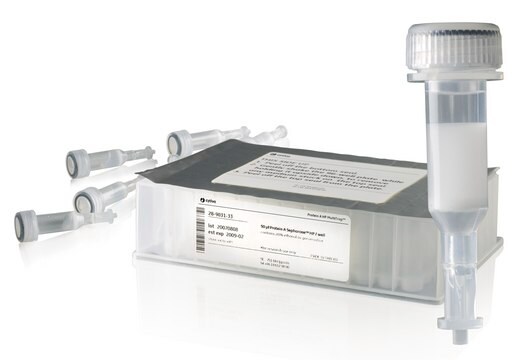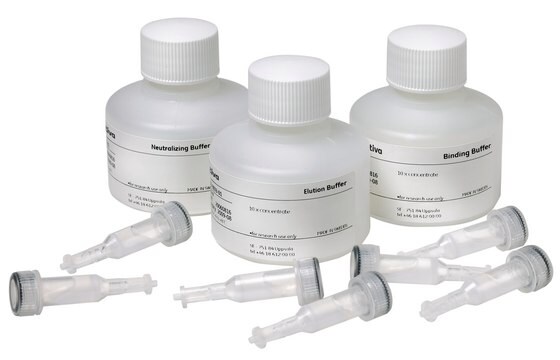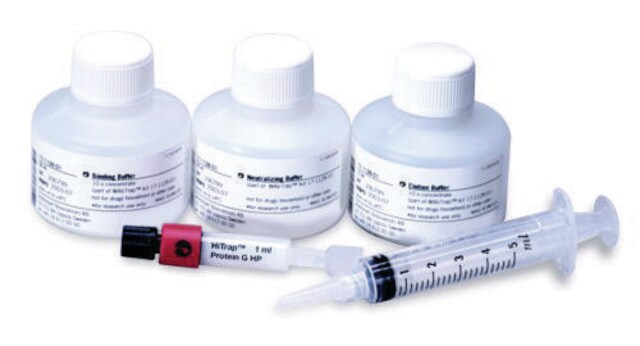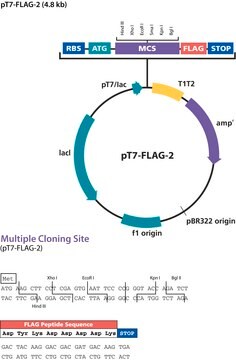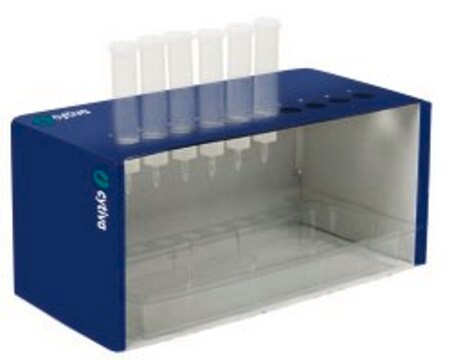PURE1A
Protein A Antibody Purification Kit
sufficient for 10 purifications
Sign Into View Organizational & Contract Pricing
All Photos(1)
About This Item
UNSPSC Code:
12352203
NACRES:
NA.32
Recommended Products
usage
sufficient for 10 purifications
shipped in
wet ice
storage temp.
2-8°C
General description
The Protein A Antibody Purification Kit provides all of the reagents necessary to isolate monoclonal and polyclonal antibodies.
Specificity
Capacity/Run (by Species)
Human IgG 20-25 mg
Mouse IgG1 8-12 mg
Mouse IgG2a 10-15 mg
Mouse IgG2b 6-10 mg
Mouse IgG3 15-20 mg
Rabbit IgG 8-12 mg
Goat IgG 2-4 mg
Bovine IgG 8-12 mg
Human IgG 20-25 mg
Mouse IgG1 8-12 mg
Mouse IgG2a 10-15 mg
Mouse IgG2b 6-10 mg
Mouse IgG3 15-20 mg
Rabbit IgG 8-12 mg
Goat IgG 2-4 mg
Bovine IgG 8-12 mg
Application
PURE-1A offers Protein A technology in a prepackaged, easy to use kit form. With this kit, milligram quantities of IgG can be purified from serum, ascites, or cell culture supernatants.
Purification of IgG from other species may be possible, however, the researcher will have to determine the suitability of the kit for their application.
The Protein A Antibody Purification Kit is suitable for use with IgGs from human, mouse, rabbit, goat, and bovine species.
Features and Benefits
- High capacity - purify up to 8 mg of mouse IgG or 25 mg of human IgG per column run
- Specific - will only bind IgG
- Easy to use - antibody is eluted and desalted in a single step, ready to use
- Gentle - avoids prolonged exposure of the antibody to low pH
Principle
Using our cartridge system, antibodies elute as highly purified proteins at physiological pH. Protein A is a powerful tool for isolation of antibodies from mammalian hosts. Protein A exhibits a high degree of specificity for IgG and ensures an antibody preparation virtually free of IgA, IgM and non-immunoglobulin serum proteins such as albumin.
Kit Components Only
Product No.
Description
- Binding Buffer 225 mL
- Desalting Cartridge 1 ea
- Elution Buffer 75 mL
- HEPES Buffer 225 mL
- 5 ml Syringe 1
- 10 ml Syringe 1
- Protein A Cartridge 1 mL
- Regeneration Buffer 75 mL
See All (8)
related product
Signal Word
Danger
Hazard Statements
Precautionary Statements
Hazard Classifications
Acute Tox. 4 Oral - STOT SE 1
Storage Class Code
6.1C - Combustible acute toxic Cat.3 / toxic compounds or compounds which causing chronic effects
Flash Point(F)
Not applicable
Flash Point(C)
Not applicable
Certificates of Analysis (COA)
Search for Certificates of Analysis (COA) by entering the products Lot/Batch Number. Lot and Batch Numbers can be found on a product’s label following the words ‘Lot’ or ‘Batch’.
Already Own This Product?
Find documentation for the products that you have recently purchased in the Document Library.
Customers Also Viewed
Marcella de Champdoré et al.
Analytical chemistry, 79(2), 751-757 (2007-01-16)
Patulin is a toxic secondary metabolite of a number of fungal species belonging to the genera Penicillum and Aspergillus. It has been mainly isolated from apples and apple products contaminated with the common storage-rot fungus of apples, Penicillum expansum, but
Andreas H Laustsen et al.
Toxicon : official journal of the International Society on Toxinology, 99, 23-35 (2015-03-17)
The venom proteome of the monocled cobra, Naja kaouthia, from Thailand, was characterized by RP-HPLC, SDS-PAGE, and MALDI-TOF-TOF analyses, yielding 38 different proteins that were either identified or assigned to families. Estimation of relative protein abundances revealed that venom is
Ignacio Gallardo-Carreño et al.
Frontiers in microbiology, 11, 590736-590736 (2021-01-05)
Perchlorate anions are produced by chemical industries and are important contaminants in certain natural ecosystems. Perchlorate also occurs in some natural and uncontaminated environments such as the Atacama Desert, the high Arctic or the Antarctic Dry Valleys, and is especially
Improved ELISA test for determination of potency of Inactivated Poliovirus Vaccine (IPV)
Hwang,G et al.
Sensors, 8(12), 2074-2079 (2008)
Bartolomeo Della Ventura et al.
PloS one, 12(2), e0171754-e0171754 (2017-02-10)
Biosensor-based detection provides a rapid and low-cost alternative to conventional analytical methods for revealing the presence of the contaminants in water as well as solid matrices. Although important to be detected, small analytes (few hundreds of Daltons) are an issue
Our team of scientists has experience in all areas of research including Life Science, Material Science, Chemical Synthesis, Chromatography, Analytical and many others.
Contact Technical Service
